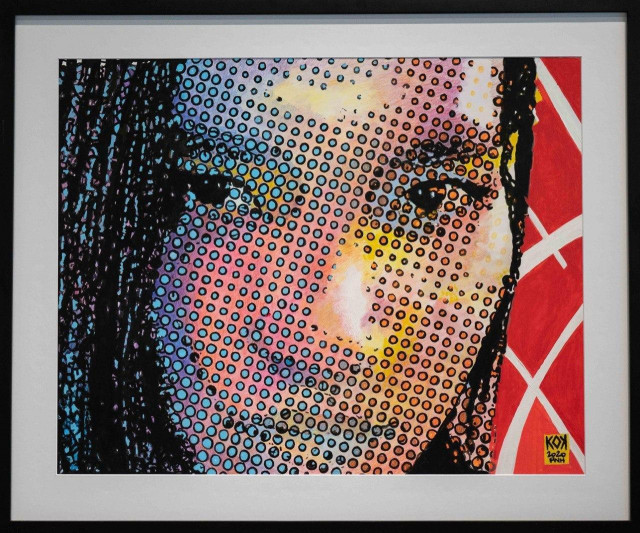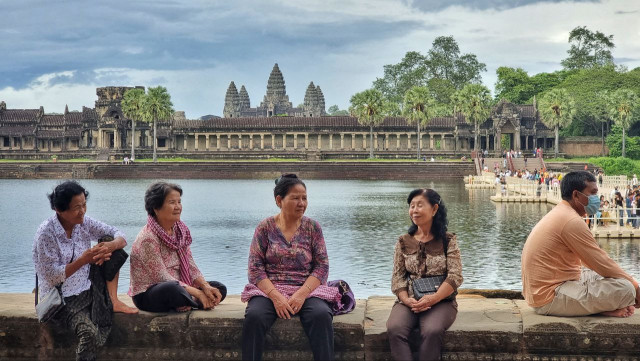The Struggle for Sex Worker Rights

- By Sao Phal Niseiy
- January 29, 2022 6:09 PM
Advocate fights for an end to discrimination
Sex work has always been considered unlawful and immoral in many societies, including Cambodia. This has led to discrimination and exploitation of many people who depend on the work to survive. Sao Phal Niseiy sat down with Seng Simouy, a freelancer and activist engaging in promoting sex workers’ rights and freedoms, to understand the sex work situation and what needs to be done to address the issues.
Sao Phal Niseiy: How do you see the current sex work situation in Cambodia?
Seng Simouy: When I think of the sex workers’ situation in Cambodia, I think of all the abuse, discrimination, exploitation, and how much suffering they handle while the rest of the society seems to enjoy the cruelty. I think of the rights that have been taken away from them and that they no longer exist in our society. I think of the future of Cambodia because sex workers’ children have neither access to education nor opportunities. It is heartbreaking.
I see that improving the situation of sex workers is going to be a hard struggle because sex work isn’t considered a legal and acceptable profession in Cambodia. Our society, laws and policies have continuously deprived sex workers of their livelihoods.
At the same time, the sex workers’ movement is still strong despite the oppression they have faced. Sex workers have been advocating and fighting for their rights for decades and the sex workers’ movement continues to strike for social justice and equality.
Sao Phal Niseiy: What prompts you to keep working to promote the rights and wellbeing of sex workers? What have you done to promote their rights?
Seng Simouy: Working with the Women’s Network for Unity (WNU)has been one of the best choices I have made in my life since sex workers are not accepted as part of society, even by their families. I had to step outside of what my culture thought was acceptable but was able to see that every human being deserves equal rights and support.
Women’s Network for Unity focuses on providing our staff with technical and legal information, and communication support and training they need to be effective. We are now in a years-long process of reviewing in detail revisions to Cambodia’s Human Trafficking Law, which significantly impacts entertainment and sex workers’ lives.
In addition, we are advocating for sex workers’ rights by sending a position paper to the relevant ministries, marching and using various forms of the arts to ensure that our demands are heard.
In the last years, I decided that I needed to be more public in my support of equal rights for sex workers. So, I told my family and friends that I was working at the organization that works with sex workers to give them greater access to public healthcare and advocate for their rights to work. I think we all need to stand up to strengthen people’s movements that strive for social justice and equality.
I have been exploring how the arts can facilitate this. Three years ago, I organized an exhibition in which we had a photographer take portraits of some of the sex workers whom we serve. We also interviewed them about what their lives have been like and how they view their work. These moving photos and the interviews were displayed at an event and allowed us to make connections with guests from other NGOs and possible new allies in our work.
I also organized United Sisterhood’s third yearly Women Art Forum under the theme “The Arts of Collective Power” with six other arts organizations in Cambodia to promote women’s rights, rights to healthcare, rights to justice, and rights to work through various art performances with 600 public audience members.
Another arts project that I initiated took place two years ago. It was a partnership with a local theatre company, The Phnom Penh Players in which one of the sex workers we serve performed alongside other women in The Vagina Monologues section. She was able to share her story of working as an independent sex worker in Phnom Penh and the challenges she faces to save her own life and her daughter.
I was very excited to learn more about how the arts can be combined with advocacy to further the mission of real gender equality. Due to the COVID-19 pandemic, WNU organized an online advocacy event aiming to seek socio-economic justice for sex workers, raise awareness about sex worker’s rights and celebrate sex worker’s day.
We at WNU created different forms of space to ensure sex worker’s voices are heard so we shared stories of sex workers whose livelihoods were hit hard by COVID-19. We also organized online discussions to understand sex workers’ living conditions during the pandemic and seek equitable solutions for them.
By the end of the event, we shared sex workers’ demands with the government and the public to provide justice that sex workers deserve as human beings. It was challenging due to the pandemic. However, we tried and nothing can stop us from advocating for their rights. They are struggling.
Sao Phal Niseiy: Just like many other places, female sex workers in Cambodia have faced frequent discrimination, exploitations and abuses while their rights have not been promoted and protected. In the meantime, they are also facing a greater risk of contracting infectious diseases. To you how can we address this problem?
Seng Simoy: Based on my experiences, I would proudly say that sex workers are the most protected group. The risks of contracting infectious diseases don’t come from sex workers and they are not spreading the diseases.
More importantly, they have taken part in a lot of health training and they are very aware of sexual infectious diseases. Sex work is one such profession. They provide services directly to clients just like other independent workers.
I have to say that it is so wrong that the public questions this because they depend on this work and they have families to take care of. They clearly won’t risk their lives and their families.
WNU has been addressing violence against sex workers and unjust cases, not diseases. If people look for someone to blame for the spread of sexual infections, they have come to the wrong place.
Sao Phal Niseiy: People argue that the Law on Suppression of Human Trafficking and Sexual Exploitation, which makes sex work illegal, has made the situation of women sex workers worse. So, do you agree with this? And should we decriminalize sex work?
Seng Simouy: This law has made the lives of sex workers worse. I do believe that every human being, including sex workers, is entitled to be protected by the law. By decriminalizing sex work, it is hoped to improve their working and living conditions. Sex work is their bread and butter. Being able to freely provide sex services is the sole livelihood of sex workers in the community.
Sao Phal Niseiy: What do you want to see change in female sex workers’ rights?
Seng Simouy: Women in sex work always face difficult situations. They struggle eternally to make a living. Due to the fact that they are discriminated against and have been ignored, there are challenges to living freely and equally.
Sex workers deserve justice and changes will have to be made. Sex workers deserve access to fully free public services, justice and freedom from discrimination and exploitation.
More importantly, I do believe that people in sex work have the right to be involved in formulating policies affecting their lives. Laws and policies need to change to address the impacts of sex work on women’s daily lives. Sex workers are human so don’t forget that they exist.















